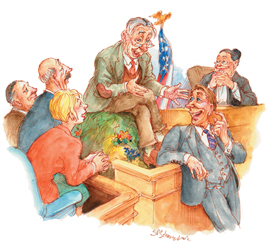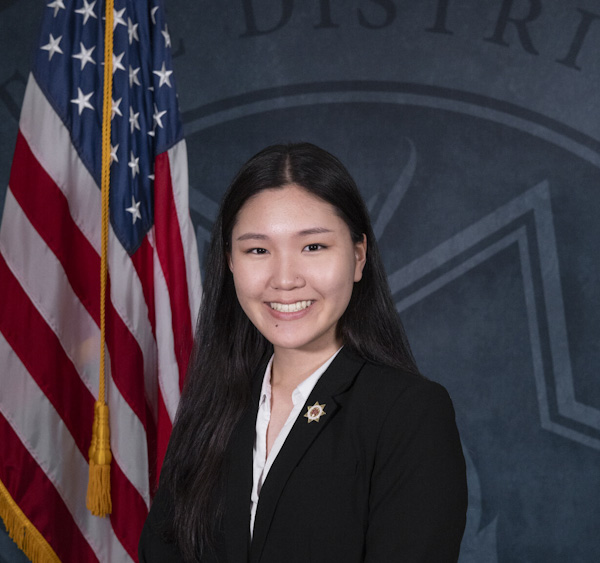Put Simply, Make Your Experts Teach

Illustration by John Schmelzer
Judge Gunn appointed Angus to defend a criminal case, and a number of us went down to watch the trial, including some of the students from my trial tactics class. It was an insanity defense—those are hard cases to win—but by the time Angus finished with the direct examination of his expert witness, all the spectators we talked to were ready to acquit the defendant right then.
Later, when we talked to Angus in the Brief Bag, one of my students, Danielle Washington, said she was particularly impressed: “I’ve never seen a psychiatrist be so down-to-earth or make so much sense.”
“Dr. Winter is a good witness,” said Angus.
“That’s not all there is to it,” said Danielle. “You’ve got some secrets for how you examine experts.”
“He has a method—a whole system,” said Regis McCormick, who has been practicing for two or three years now. “This is the second time I’ve seen him examine an expert, and I meant to concentrate on how he does it, but I got so interested in the doctor’s testimony, I forgot to take notes on what Angus was doing.”
Angus smiled. “That’s the way it’s supposed to be,” he said. “It would never do for the jury to concentrate on me instead of on my witness.”
“Well, I’m not too proud to ask,” said Regis. “How’d you do that?”
“Right,” said Danielle. “Give us the secret. Don’t be like Professor McElhaney and just tell us what other people do. Tell us how you do it—what your system is.”
Angus said, “Just because I do something doesn’t make it right. And besides, there are some things I do that lots of good lawyers disagree with.”
But I already had my pencil out. I knew Angus couldn’t resist an invitation like that. Here are my notes.
THE HIGH GROUND OF CREDIBILITY
The point of calling an expert witness is not to put a hired gun on the stand who will argue the case for you.
Adding a “witness” who is actually just another advocate creates credibility problems you don’t need.
And the point of calling an expert witness is not to have some professional sage fill the courtroom with incomprehensible erudition. People are reluctant to accept what they don’t understand.
Neither is the point to try to make the jury be so overwhelmed by the incredible qualifications and the impressive professional background of the expert that it will assume everything the witness says is true. Juries are not nearly as impressed with fancy qualifications as lawyers are.
The point of calling an expert is to put a teacher on the stand—an explainer who brings another set of eyes into the room through which the judge and jury can see the facts and understand your case. An expert witness is another opportunity to seize the high ground of credibility—to provide a trustworthy guide who can lead fact finders through the thicket of the case.
If this is your mindset, everything else will fall into place.
Credibility is at the heart of every case. And the teacher is a fundamental symbol of credibility in our society. So look for someone who loves to explain things to other people, who feels natural with a piece of chalk in hand, who enjoys showing others how things work.
Hard as it is to find an expert who is a good explainer, it’s easier to find one than it is to make one. Every field is filled with highly qualified individuals who lack the gift of making things clear to others. You simply do not have the time to show someone else how to be a wonderful teacher.
Beware of witnesses who say your case deals with difficult concepts that are too hard for ordinary people to grasp. That is the one idea they are sure to communicate to the judge and jury.
And listen closely to the witness’s vocabulary. You don’t want a witness who uses professional jargon to keep the uninitiated out of the inner circle. You want someone who enjoys sharing the secrets with others.
You want your expert to make the judge and jury understand things they didn’t know before the trial, ideas they can share with others. It makes them heroes and heroines of the breakfast table.
That’s important. The juror who gets an idea from your expert and passes it on to someone else is not just a simple conduit of information. Using something that came from your expert means the juror trusted your witness enough to share that idea with someone else. When jurors do that as part of their personal quest for admiration and respect, guess what: They are buying what you are selling.
It can even happen with judges. When Michelle R. Slack of the U.S. Department of Justice (now a professor at Southern Illinois University School of Law in Carbondale) was trying a case, she made simple sense out of a difficult statute for the trial judge.
Then when the other lawyer tried to put her spin on the statute, the judge waved her argument aside. “I want to hear Ms. Slack say it again,” he said. “I understood it when she explained it.” You know, without having to ask, how the case came out.
LET THE WITNESS REPEAT YOUR STORY
Stories are what we use to process facts. and if you did it right, you already told the story of the case in your opening statement.
So why do it again?
One reason is just to let the judge and jury hear your story in another voice. Sometimes a different voice will reach people you did not.
Closely connected with the effect of the second voice is the subliminal message that someone else accepts your facts (a message we used to try to stop with the rule that required experts to answer hypothetical questions, lest their answers suggest they actually believe your case).
But the main reason is to give the judge and jury a new point of view—a different way of approaching the case—from the standpoint of the expert witnesses:
• From the design engineer comes the story of deciding between safety and convenience—a story that always seems to end in compromise.
• From the doctor comes the story of what a jagged piece of metal did to the plaintiff’s—Jack Marcus’—left eye.
• And from the economist comes the rest of the story—the medical bills, the cost of college for the two children, and the fading market for the skills of Mr. Marcus, who now has serious vision problems.
Don’t use the awful jargon of education theory; choose some simple words that will shape the testimony of the witness and influence how the judge and jury look at what they are hearing.
Read this little vocabulary list right before you do the direct examination of any expert witness, and work these words or phrases into your questions: teach, tell, explain, help us understand, help us learn, educate us about, demonstrate, interpret, untangle or decipher.
Stay away from words like indicate, elucidate, illuminate, explicate, expound, discern, enlarge upon or assist us in comprehending. Those words make you sound like a twit and encourage your witness to sound like one, too.
You want to use demonstrative evidence to make your case come alive. And demonstrative evidence in the hands of a good expert witness is particularly powerful.
But even when you don’t have a piece of demonstrative evidence, you can still use demonstrative testimony.
Demonstrative testimony?
There is magic in words that make people see what you are saying, words like show, see, watch, look at, view, picture, demonstrate, scene or take us there.
There is power in simple, well-put questions. See how using the words of both teaching and visualization create questions that will inspire vivid testimony from experts:
Q: Dr. Sweeney, we need you to teach us a little about the spleen so we can understand what went wrong in the hospital. Take us to the operating room and let us see what’s happening.
Q: Ms. Wildt, help us look at this bridge through the eyes of a design engineer. What should we be looking for in this diagram?
Q: Dr. Winter, we want to understand what these delusions were doing to Joan Quigley. Give us a picture of what was going on in her mind.
Not only do questions like these produce vivid testimony; they also help jurors visualize what the witness says.
And you want the jurors to see your facts. That way they are eyewitnesses to your case.
McELHANEY AT HIS BEST
The ABA Journal is occasionally reprinting some of Jim McElhaney’s most popular columns from past years. This article originally appeared in the Journal’s May 1997 issue under the headline “Terms of Enlightenment.”
Jim McElhaney is the Baker and Hostetler Distinguished Scholar in Trial Practice at Case Western Reserve University School of Law in Cleveland and the Joseph C. Hutcheson Distinguished Lecturer in Trial Advocacy at South Texas College of Law in Houston. He is a senior editor and columnist for Litigation, the journal of the ABA Section of Litigation.



